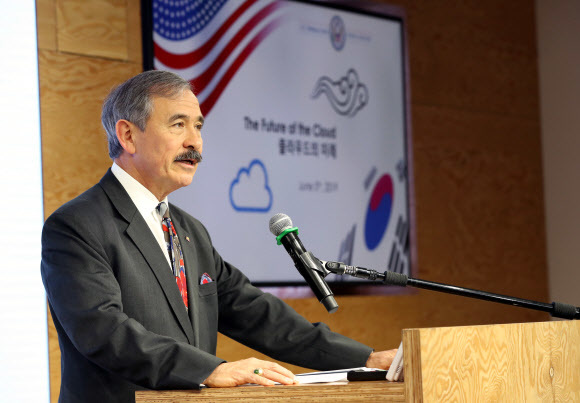 |
|
US Ambassador to South Korea Harry Harris gives a keynote address at the “Future of the Cloud” event hosted by the US Embassy Seoul and the Korea Internet Corporations Association at Facebook Korea on June 5. (Yonhap News)
|
Harry Harris remarks directly after his call for SK firms to stop using Huawei equipment
US Ambassador to South Korea Harry Harris stressed that issues between South Korea and Japan should not be allowed to interfere with their trilateral cooperation with the US. His remarks were seen as sending the message that South Korea and Japan’s diplomatic and military conflicts over issues such as compensation for workers forcibly mobilized under the Japanese colonial occupation and the use of radar in response to flybys against South Korean warships by Japanese patrol aircraft should not get in the way of US strategy targeting China. Coming on the heels of a June 5 conference where Harris called on South Korean companies collaborating with the Chinese network equipment company Huawei to choose a “trustworthy” supplier, the remarks clearly indicated the US’ strategic goals in terms of South Korea-Japan relations. With Harris appearing to overtly pressure the government of his host country South Korea in remarks on successive days, some observers are calling his approach “incautious” and “contrary to diplomatic practice.” On the afternoon of June 7, Harris delivered a keynote speech for the 27th Defense/Military Seminar, held by the Korea Association of Military Studies and Korea National Defense University at the Ministry of National Defense Convention Center in Seoul’s Yongsan neighborhood. During the speech, he stressed the importance of not allowing bilateral issues between South Korea and Japan to interfere with the three sides focusing on their strategic responsibilities with regard to North Korea and other matters with regional and global influence. He went to say that he looked forward to the three sides cooperating. His remarks were read as calling for improvements to South Korea-Japan relations in the strategic interest of beefing up trilateral cooperation. The US recently announced its “Indo-Pacific Strategy,” which involves stronger cooperation with allies to block China’s expansion. Washington’s recent heavy emphasis on trilateral cooperation with Seoul and Tokyo is also part of the same strategy. During the 18th Shangri-La Dialogue (Asian Security Summit) in Singapore on June 2, South Korean Minister of National Defense Jeong Kyeong-doo, US Acting Secretary of Defense Patrick Shanahan, and Japanese Minister of Defense Takeshi Iwaya agreed on the importance of building mutual military trust in relation to regional security, and on measures to bolster cooperation to institutionalize this. At the beginning of the summit, Shanahan described the three sides as dynamic and powerful forces for democracy in the Pacific and said the US would continue to prioritize the trilateral discussion framework and strengthen cooperation. Remarking on the issue of the Korean Peninsula’s denuclearization, Harris said the US was still prepared to take concrete measures to transform its relationship with North Korea in tandem with denuclearization and to establish a permanent and stable peace regime on the peninsula. He also noted that US President Donald Trump was continuing to reach out to North Korean leader Kim Jong-un even after North Korea’s missile test launches last month, adding that Trump was making it clear that the door to dialogue and negotiation remains open. By Yoo Kang-moon, senior staff writer Please direct comments or questions to [english@hani.co.kr]





